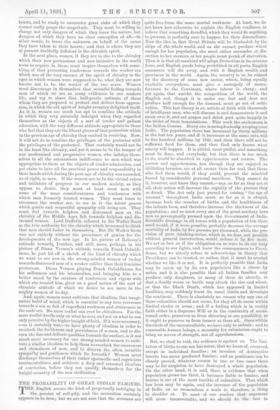THE PROBABILITY OF GREAT INDIAN FAMINES.
T"English accuse the Irish of perpetually indulging in the passion of self-pity, and the accusation certainly appears to be true; but we are not sure that the accusers are
quite free from the same mental weakness. At least, we do not know how otherwise to explain the English readiness to believe that something dreadful, which they would do anything to prevent, is perfectly sure to happen for their discomfiture. Now the idea is, that Great Britain will be blockaded by the
ships of the whole world, and as she cannot produce wheat enough for her population, she must either surrender at dis- cretion to her enemies, or her people must perish of starvation. Then it is that all mankind will adopt Protection in its extreme form, and English goods being prohibited in all ports, English commerce will die away, and with it English wealth and greatness in the world. Again, the country is to be ruined by the discovery of some new motor, which, being equally available everywhere, must give a monopoly of manu- factures to the Continent, where labour is cheap ; and yet again, that amidst the competition of the world, the English soil, though it is under our feet and• does not produce half enough for the demand, must go out of culti- vation. This last theory is an article of faith with thousands of intelligent men, who will discuss it and demonstrate it and moan over it, and eat grapes and drink port quite happily in the midst of their lamentations. This week the excitement is the Indian Census. Every one is metaphorical* weeping over India. The population there has increased by thirty millions in the last ten years, and if it increases at the same rate, will be five hundred millions by 1941, and then there will not be sufficient food for them, and then God only knows what misery will happen. It is pitiful, most pitiful, and something must be done, and everybody, but that there is too much to do, would be absorbed in apprehension and sorrow. The sorrow and apprehension, too, though they are enjoyed as titillating luxuries, are at all events thus far real, that those who feel them would, if they could, prevent the mischief feared by considerable personal sacrifices. They cannot do it, however, and know they caunot,—na,y, so far as they act at all, their action will increase the rapidity of the process they so dread. The Act only just passed for raising "the age of consent" throughout India must, so far as it is obeyed, increase both the number of births and the healthiness of the infants born, and therefore increase the thickness of the population ; and so must every one of the great sanitary laws now so peremptorily pressed upon the Government of India. Scientific drainage in all towns with a population of ten thou- sand would, if it were possible, probably decrease the average mortality of India by five persons per thousand, while the pro- vision of pure drinking-water, which is, we fear, not possible without general insurrection, would reduce it by five more. We act in fact as if the obligation on us were to do our duty according to our lights, and leave the consequences to Provi- dence, but we utterly refuse to acknowledge in theory. that Providence can be trusted, or rather, that it must be trusted whether we like it or not. It is perfectly possible that India may be eaten up by its own population like a cheese by mites, and it is also possible that all Indian families may produce only daughters, as many of them do already, or that a deadly worm or beetle may attack the rice and wheat,
or that the Black Death, which has appeared in limited localities, may suddenly burst its usual limits and devastate the continent. There is absolutely no reason why any one of those calamities should not occur, for they all do occur within limited circles or areas ; and if a feeling which is in reality faith either in a Supreme Will or in the continuity of accus- tomed order, preserves us from shivering at one possibility, so it ought to preserve us from tremor at them all. Once within the circle of the uncontrollable, we have only to submit ; and to reasonable human beings, a necessity for submission ought to bring an access of strength, not of apprehensions.
But, we shall be told, the evidence is against us. The limi- tation of births to one sex has never, that we know of, occurred, except in individual families ; an invasion of destructive insects has never produced famine ; and no pestilence can be clearly proved, whatever reason in one or two cases there may be for suspicion, to have destroyed a whole population. On the other hand, it is said, there is evidence that when population grows too thick, it becomes liable to famine, and famine is one of the most terrible of calamities. That which has been may be again, and the increase of the population of India on so tremendous a scale is, therefore, a thing to shudder at. To most of our readers that argument will seem unanswerable, and we should be the last to deny it a certain force; but its force is nevertheless mainly theoretical. Where is the evidence of any connection between thickness of population and liability to famine P It is quite true that famine has struck thick populations, as in Ireland and some parts of China ; but then, it has also struck thin ones, some of the worst famines on record having desolated thinly peopled countries. Famines spring from failure of crops, from floods, from drought, or from the interruption of agriculture, and with none of these causes has thickness of population anything to do. The thickest population in the world, in proportion to its means of subsistence, is that of England, and it has been singularly exempt even from the fear of famine. The case of Ireland is incessantly quoted; but the potato crop did not perish, and could not perish, because there were many Irishmen to plant, and dig up, and eat potatoes ; and if the potatoes had not been stricken with a disease still unexplained, but certainly not pro- ceeding from the numbers of husbandmen, Irishmen would not have been stricken either. Much is made of Chinese famines; but they do not attack the whole land, and the very thickest districts are not those assailed. In India, the densely populated rice districts have been exempt for a century, while famine desolated the far thinner population of Behar, and the actually thin population of Orissa. There was, indeed, an awful famine a century ago in the rice districts, the famine described by Macaulay, and due in part, as natives believed, to the English regrating of rice ; but that famine fell on a population which there is every reason to believe was exactly half as thick as at present, and had precisely the same system a agriculture, for the English, who have done something to irrigate the wheat-bearing districts, have done nothing whatever in the great provinces yielding rice. It may be true, as man, with his usual presumption, frequently asserts, that famine is Nature's remedy for over-population ; but if so, Nature usually makes the inexplicable mistake of leaving the thickest populations alone, sparing Belgium while striking Morocco. There may be a connection between density of population and a failure of food, but it is not visible in history, and not deducible from any process of reasoning, even the a priori one, which would rather suggest that when men grow over-numerous, they would cultivate more carefully, a theory realised in action in China, in Egypt, in ancient Peru, and in the rice-bearing deltas of Bengal. There is, in truth, no evidence that the consumption of an agricultural people has ever overtaken its normal pro- duction of food,—that is, its production when Nature works in her accustomed way. There is famine in Egypt when the Nile fails, as it must have failed in Joseph's time ; but the Nile fails because of deficient rainfall on the East African hills, not because there are too many Egyptians on the river's bank. Of course, if the population is thick, a famine kills more people than if it is thin, and therefore causes more suffering ; but the thickness or thinness of population has nothing to do with famine. Hooghly, with 800 people to the square mile, is ten times as safe from the destroyer as Bellary, with only 125.
But population might be too thick for the means of subsist- ence. Clearly ; and two planets might collide. There is nothing to stop either calamity, except, as the men of science would say, the unalterable order of things, or, as we should say, the supreme will of the Creator, who will allow our de- struction when his purpose is accomplished, and not before. It is reasonable to speculate on what might happen if numbers grew too great in any one locality, as it is reasonable to specu- late on the effect of unexpected movements in the heavenly bodies ; but to feel fear about either is uselessly to depress a store of vitality never too large for the race.



































 Previous page
Previous page